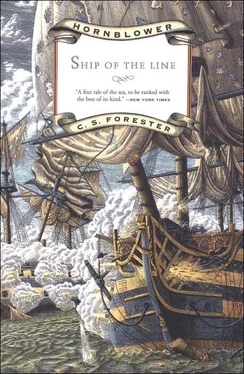He emerged through the fore hatchway on to the maindeck a little unexpectedly. Thompson, one of the captains of the forecastle, was dealing with the new hands.
“P’raps we’ll make sailors of you,” he was saying, “and p’raps we won’t. Overside with a shot at your feet, more likely, before we sight Ushant And a waste o’ good shot, too. Come on wi’ that pump, there. Let’s see the colour o’ your hides, gaol-birds. When the cat gets at you we’ll see the colour o’ your backbones, too, you—”
“Enough of that, Thompson,” roared Hornblower, furious.
In accordance with his standing orders the new hands were being treated to rid them of vermin. Naked and shivering, they were grouped about the deck. Two of them were having their heads shorn down to the bare skin; a dozen of them, who had already submitted to this treatment (and looking strangely sickly and out of place with the prison pallor still on them) were being herded by Thompson towards the wash-deck pump which a couple of grinning hands were working. Fright was making them shiver as much as cold—not one of them, probably, had ever had a bath before, and what with the prospect, and Thompson’s bloodcurdling remarks and the strange surroundings, they were pitiful to see.
It enraged Hornblower, who somehow or other had never forgotten the misery of his early days at sea. Bullying was abhorrent to him like any other sort of wanton cruelty, and he had no sympathy whatever with the aim of so many of his brother officers, to break the spirit of the men under him. One of these days his professional reputation and his future might depend on these very men risking their lives cheerfully and willingly—sacrificing them, if need be—and he could not imagine cowed and broken-spirited men doing that. The shearing and the bath were necessary, if the ship was to be kept clear of the fleas and bugs and lice which could make life a misery on board, but he was not going to have his precious men cowed more than was unavoidable. It was curious that Hornblower, who never could believe himself to be a leader of men, would always lead rather than drive.
“Under the pump with you, men,” he said kindly, and when they still hesitated—“When we get to sea you’ll see me under that pump, every morning at seven bells. Isn’t that so, there?”
“Aye aye, sir,” chorused the hands at the pump—their captain’s strange habit of having cold seawater pumped over him every morning had been a source of much discussion on board the Lydia.
“So under with you, and perhaps you’ll all be captains one of these days. You, there, Waites, show these others you’re not afraid.” It was blessed good fortune that Hornblower was able not only to remember the name, but to recognise in his new guise Waites, the sheepstealer with the moleskin breeches. They blinked at this resplendent captain in his gold lace, whose tone was cheerful and whose dignity still admitted taking a daily bath. Waites steeled himself to dive under the spouting hose, and, gasping, rotated heroically under the cold water. Someone threw him a lump of holystone with which to scrub himself, while the others jostled for their turn—the poor fools were like sheep; it was only necessary to set one moving to make all the rest eager to follow.
Hornblower caught sight of a red angry welt across one white shoulder. He beckoned Thompson out of earshot. “You’ve been free with that starter of yours, Thompson,” he said. Thompson grinned uneasily, fingering the two-foot length of rope knotted at the end, with which petty officers were universally accustomed to stimulate the activity of the men under them.
“I won’t have a petty officer in my ship,” said Hornblower, “who doesn’t know when to use a starter and when not to. These men haven’t got their wits about ‘em yet, and hitting ‘em won’t remedy it. Make another mistake like that, Thompson, and I’ll disrate you. And then you’ll clean out the heads of this ship every day of this commission. That’ll do.”
Thompson shrank away, abashed by the genuine anger which Hornblower displayed.
“Keep your eye on him, Mr. Bush, if you please,” added Hornblower. “Sometimes a reprimand makes a petty officer take it out of the men more than ever to pay himself back. And I won’t have it.”
“Aye aye, sir,” said Bush, philosophically.
Hornblower was the only captain he had ever heard of who bothered his head about the use of starters. Starters were as much part of Navy life as bad food and eighteen inches per hammock and peril at sea. Bush could never understand Hornblower’s disciplinary methods. He had been positively horrified when he had heard his captain’s public admission that he, too, had baths under the washdeck pump—it seemed madness for a captain to allow his men to guess that they were of the same flesh as his. But two years under Hornblower’s command had taught him that Hornblower’s strange ways sometimes attained surprising results. He was ready to obey him, loyally though blindly, resigned and yet admiring.
“The boy from the Angel has brought a note, sir,” said the landlady, when Hornblower called her in in reply to her knock at the sitting-room door. “He waits an answer.”
Hornblower felt a shock as he read the address—the clear feminine handwriting which he recognised although it was months since he saw it last meant so much to him. He tried to disguise his feelings as he spoke to his wife.
“It is addressed to both of us, my dear,” he said. “Shall I open it?”
“As you please,” said Maria.
Hornblower broke the wafer and unfolded the note.
The Angel Inn, Plymouth.
Fourth May, 1810.
Rear Admiral Sir Percy and Lady Barbara Leighton would esteem it an Honour if Captain and Mrs Horatio Hornblower would dine with them at this address Tomorrow, the Fifth, at four o’clock.
“The Admiral is at the Angel. He wants us to dine with him tomorrow,” said Hornblower, as casually as his beating heart would allow. “Lady Barbara is with him. I think we must accept, my dear.”
He passed the note over to his wife.
“I have only my blue sack gown,” said Maria, looking up from reading it.
The first thing a woman ever thought about on receiving an invitation was what she should wear. Hornblower tried to bend his mind to the consideration of the blue sack gown, when all the time his heart was singing songs at the knowledge that Lady Barbara was only two hundred yards away.
“It looks perfect on you, my dear,” he said. “You know how much I have always liked it.”
It would call for a far better gown to look well on Maria’s dumpy figure. But Hornblower knew that they must—they must –accept the invitation, and it would be a kindness to reassure Maria. It did not matter what clothes Maria wore as long as she thought she looked well in them. Maria smiled happily at the compliment, giving Hornblower a prick of conscience. He felt like Judas. Maria would look coarse and badly dressed and stupid beside Lady Barbara, and yet he knew that as long as he pretended to be in love with her she would be happy and unconscious.
He wrote a careful acceptance, and rang the bell for it to be given to the messenger. Then he buttoned his uniform coat.
“I must go down to the ship,” he said.
Maria’s reproachful look hurt him. He knew that she had been looking forward to spending the afternoon with him, and indeed he had not intended to visit the ship that day. It was only an excuse to gain privacy for himself. He could not bear the thought of being mewed up in that sitting-room with Maria and her platitudes. He wanted to be alone to hug to himself the thought that Lady Barbara was in the same town, that he was going to see her tomorrow. He could not sit still with those thoughts bubbling within him. He could have sung for joy as he walked briskly down to the ferry, thrusting aside all remembrance of Maria’s dutiful acquiescence in his departure—well she knew how great were the demands made upon a captain by the commissioning of a ship of the line.
Читать дальше









